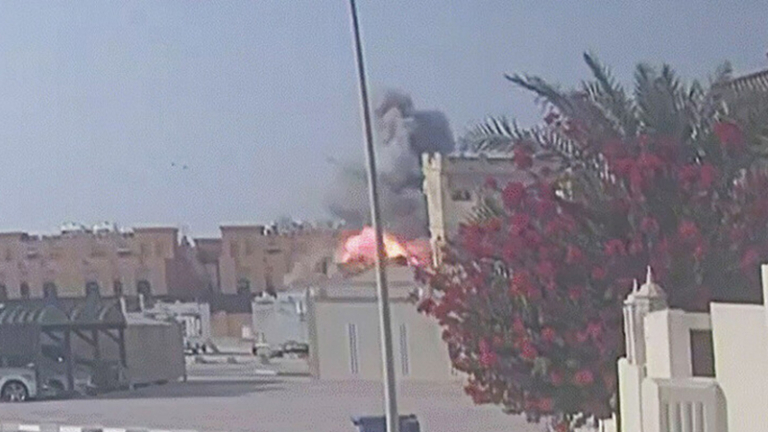
On September 9, 2025, Israel attacked a Hamas delegation in Doha, Qatar, as it was meeting to discuss the latest US-brokered ceasefire proposal to halt the war in Gaza. Israel’s airstrike coincided with its all-out assault on Gaza City and its earlier attacks on Iran, Lebanon, Syria, and Yemen. On September 15, US Secretary of State Marco Rubio said that a diplomatic solution to end Gaza’s tragedy “may not be possible.” President Donald Trump reportedly said that he felt “very badly about the location of the attack” that struck Qatar, a US ally, but the White House’s unconditional support of Israel’s war goals outstrips any rhetorical regret from Washington.
Israel’s attack on Doha has likely torpedoed Qatar’s efforts to bring peace to Gaza. Doha’s long history of mediation in regional conflicts may face insurmountable obstacles in the future. The dire straits in which Qatari diplomacy now finds itself unhappily coincide with the 80th anniversary of the founding of the United Nations (UN) celebrated at the UN General Assembly on September 22, 2025. Over the years, the UN has repeatedly failed to live up to the lofty goals of its 1945 Charter, which establishes its mission as “to save succeeding generations from the scourge of war and …to establish conditions under which justice and respect for the obligations arising from treaties and other sources of international law can be maintained.” Nearly two years after October 7, 2023, with Qatari mediation stalled (or worse), the UN failing to play any meaningful role in stopping the Gaza war, and the Trump administration apparently stepping back from Gaza diplomacy, international efforts to end the Gaza genocide look bleaker than ever.
Israel’s Attack in Doha
Israel claimed that its Doha airstrike was an attempt to kill senior negotiators, most prominently Khaled Meshaal, former head of the organization’s political bureau, and its current acting chair, Khalil al-Hayya. The attack failed to take out either man, but reportedly killed five lower-ranking Hamas members—including al-Hayya’s son—and a Qatari security official.
Israel has a long track record of assassination attempts against Hamas leaders in other countries. For example, in 1997, during Prime Minister Benjamin Netanyahu’s first term in office, Israel attempted to poison Meshaal in Amman, Jordan, but was pressured into providing the antidote at the request of the Jordanian monarch, King Hussein. More recently, in 2024, Israel assassinated Ismail Haniyeh, the chair of the Hamas political bureau, while he was visiting Iran.
Israel has a long track record of assassination attempts against Hamas leaders
Israel’s Doha attack has made it difficult if not impossible to proceed with ceasefire negotiations with Hamas—which was perhaps Netanyahu’s goal. The attack also halted the Trump administration’s attempts to expand the Abraham Accords, the US-brokered agreements that have since 2020 normalized relations between Israel and Bahrain, Morocco, and the United Arab Emirates. The mass killing in Gaza, along with Israel’s many other post-2023 attacks across the region, from Lebanon to Syria to Yemen, were already making it difficult for other Gulf Cooperation Council members, namely Saudi Arabia, to consider jumping on the Abrahamic peace train. Indeed, on September 15, 2025, the Arab-Islamic summit in Doha convened after the attack recommended that all member countries should review their diplomatic ties, impose sanctions, and suspend weapon transfers to Israel.
Israel-Hamas Negotiations
Although Israeli and Hamas negotiators reportedly have never held direct talks, the two sides have frequently communicated through third-party mediators since Hamas won the 2006 Palestinian national elections. Working individually or in tandem, Egypt and Qatar have sponsored ceasefires and prisoner swaps between Israel and Hamas since at least 2008. Cairo and Doha have continued to serve as mediators for ceasefire talks during Israel’s current war on Gaza. On January 15, 2025, they announced a ceasefire agreement, which broke down two months later when Israel launched renewed attacks on Gaza. The Israeli government insisted that the destruction of Hamas was its key objective—despite Hamas’s assertion that it was genuinely interested in negotiating an end to the conflict.
Beyond such state mediation efforts, peace activists on both sides have explored the potential for a direct peace agreement between Palestinians and Israelis. Israeli activist Gershon Baskin attempted to connect both sides to negotiate a long-term ceasefire agreement and, following several face-to-face contacts with Hamas, said he received assurances that Hamas was ready for peace—though he was personally skeptical about any future role for the organization in Gaza. Organizations like the US-based Jewish Voice for Peace, Israel’s B’Tselem, and Palestinian groups Al-Haq and Addameer have advocated for justice and accountability at the grassroots level. Prominent cultural figures on each side have attempted to use culture to build bridges, such as Israeli Daniel Barenboim and Palestinian-American Edward Said’s work to establish an Israeli-Palestinian symphony orchestra. The Alliance for Middle East Peace—a coalition of more than 160 civil society organizations involving hundreds of thousands of Israelis and Palestinians—has served as an umbrella organization to advance collaboration. Such initiatives indicate that at least at the popular level, there is a desire for peace. Since the start of the October 7 war, new peace activists—principally parents of Israeli and Palestinian children directly affected by the violence—have worked to release hostages and prisoners and to end the assault on Gaza.
Implications for Qatari Mediation
Despite repeated Israeli attacks, Hamas has never officially renounced negotiations—though it will likely think twice before sending delegations to any future talks. Although shocked and angered by Israel’s attack on Doha, Qatar has not formally abandoned its role as mediator, saying on September 17, 2025, only that it “does not appear realistic at the moment.” Qatari Prime Minister and Foreign Minister Mohammed Abdelrahman Al Thani defended his country’s role as a regional mediator, which he said would continue undeterred. The United States has in the past benefited from Qatari mediation, most notably in long negotiations with the Taliban, which ultimately reached an agreement that facilitated the 2021 US withdrawal from Afghanistan, and with Iran, which in 2023 resulted in prisoner exchange. Washington notably asked Doha to continue its role as Gaza mediator after the Israeli attack.
The Failure of the United Nations
The failure of the United Nations to bring an end to the Gaza war stems from the volatile situation in the Middle East and from long-standing structural constraints of the organization itself. The disparity between the UN General Assembly, where all member states vote equally, and the Security Council, in which the permanent five members have veto power, means that binding decisions regarding the most serious conflicts are stymied in the absence of consensus among the five—which is almost always the case. The United States is the most egregious abuser of the veto power, using it six times in support of Israel since October 2023 to block votes of censure of Israel and ceasefire resolutions.
Israel has defied more UN resolutions than all other countries combined
Historically, Israel has ignored or defied more UN General Assembly resolutions than all other countries combined. In 2024 alone the General Assembly passed 18 resolutions on Israel compared to only seven on other countries. Founded after the devastation of World War II to mediate conflict and avoid another global conflagration, the UN’s credibility suffers irreparable damage when its decisions and recommendations are thwarted by member states with impunity.
Various UN agencies operate in the Middle East, including the Economic and Social Commission for Western Asia (ESCWA), the UN Relief and Works Agency for Palestinian Refugees (UNRWA), the UN High Commissioner for Refugees (UNHCR), the UN Children’s Fund (UNICEF), and the office of the UN Special Coordinator for the Middle East peace process (UNSCO). These organizations have made significant contributions over the years but those working in Gaza and the West Bank now face an increasingly dangerous operating environment while being denied any facilitative support from the occupying power, a problem aggravated by the Trump administration’s withdrawal of funding from UNRWA. Although UNRWA has been vital in aiding Palestinian refugees across the region, it came under special scrutiny when Israel accused UNRWA staff of participating in the October 7 Hamas attack. An UNRWA investigation was unable to corroborate the information upon which Israel based the accusations but dismissed nine staff members who may have been involved. Israel has officially banned UNRWA from operating in Gaza, the West Bank, and East Jerusalem. In reaction to these accusations, the United States has ceased funding and dealing with this UN agency.
The foremost official juridical body of the UN, the International Court of Justice (ICJ), is quickly losing credibility after Israel has defied its decisions. In November 2024, a non-UN body, the International Criminal Court (ICC), issued arrest warrants for Prime Minister Netanyahu and former defense minister Yoav Gallant for their responsibility for war crimes in Gaza. Israel challenged ICC jurisdiction regarding the Gaza war, said it would ignore the indictments, and asked for a six-month delay in rebutting the findings of the ICJ. If ICC signatories do not honor their obligations to implement ICC advisory opinions and findings on the illegality of Israel’s occupation of Palestinian territories—among them that the war on Gaza meets at least four of the five criteria for genocide—they risk undermining the basic principles of the international legal system.
Downgrading Diplomacy
The Trump administration’s recent decision to rename the US Department of Defense the ‘Department of War’ follows a series of other steps to downgrade American diplomacy and soft power. In his second term, President Trump has already terminated 250 Foreign Service officers—making a total of some 1,300 employees now fired from the Department of State—and eliminated 10,000 jobs from the now-defunct Agency for International Development (USAID). These cuts have dealt a severe blow to the foreign service establishment and its institutions. Other important channels for US soft power, such as the Voice of America (VOA) and its foreign-language stations, including the Arabic al-Hurra, have been nearly dismantled. For important international engagement, the President prefers to rely on a handful of loyal political appointees, family members, and his own direct communications with foreign leaders.
The White House’s response to Israel’s attack in Doha suggests some embarrassment over the impact on Qatar, which has for decades been a close US ally. Nevertheless, the fundamentals of Trump’s Middle East policy remain the same: steadfast support for Israel, a focus on commercial mega-deals with rich Gulf states such as Saudi Arabia and the United Arab Emirates, and commercial, economic, and security ties between Israel and Gulf states through the Abraham Accords. Trump’s supporters apparently see this transactional strategy as enhancing US national interests as well as security and stability in the Middle East—even though it stomps on the basic human rights of Palestinians and ignores Israel’s increasingly dangerous airstrikes against targets in Lebanon, Syria, Yemen, and Iran.
In contrast to decades of US attempts and failures to achieve peace through diplomacy, Trump’s Middle East policy posits economic development as a road to peace and advocates lucrative deals and investments as a way to end conflict. But an approach that ignores deeply-rooted Palestinian aspirations can promise at most only temporary respite from current military confrontations and at worst the outbreak of new conflicts.
The views expressed in this publication are the authors’ own and do not necessarily reflect the position of Arab Center Washington DC, its staff, or its Board of Directors.

